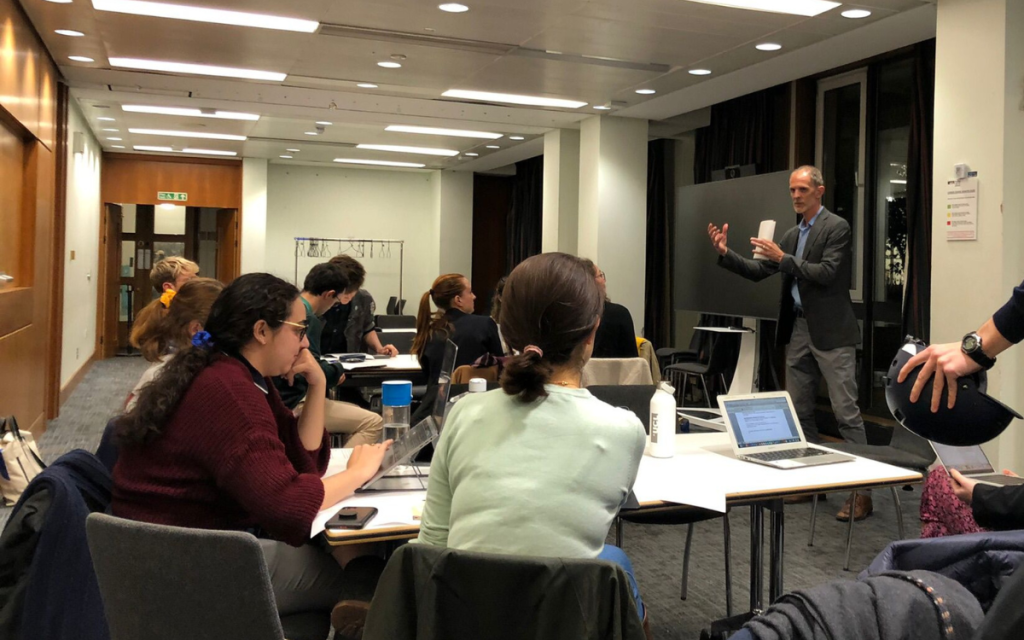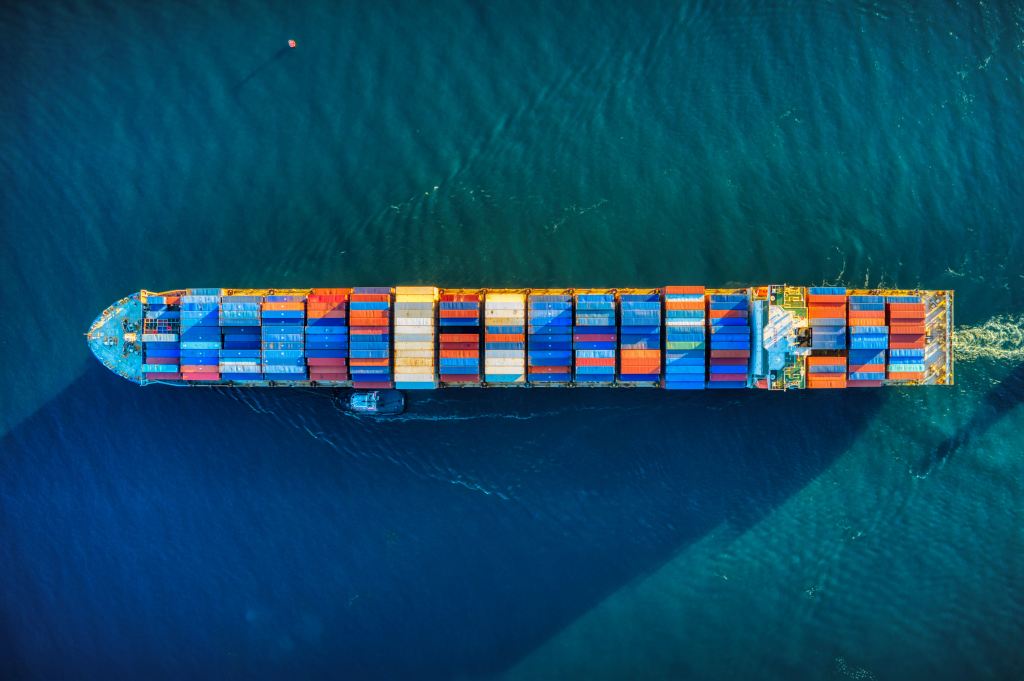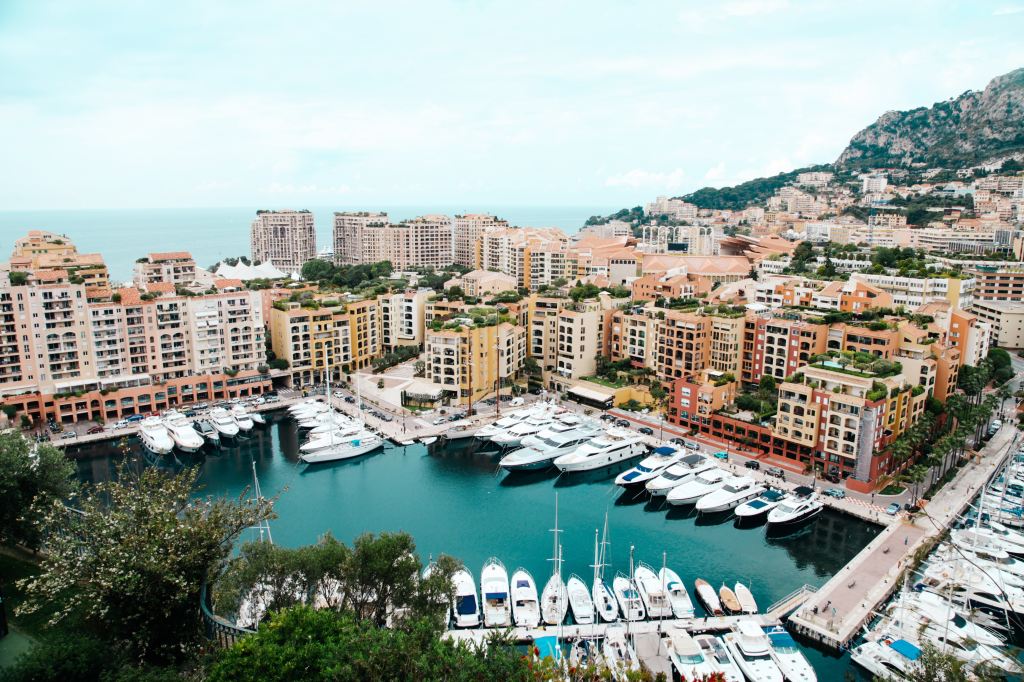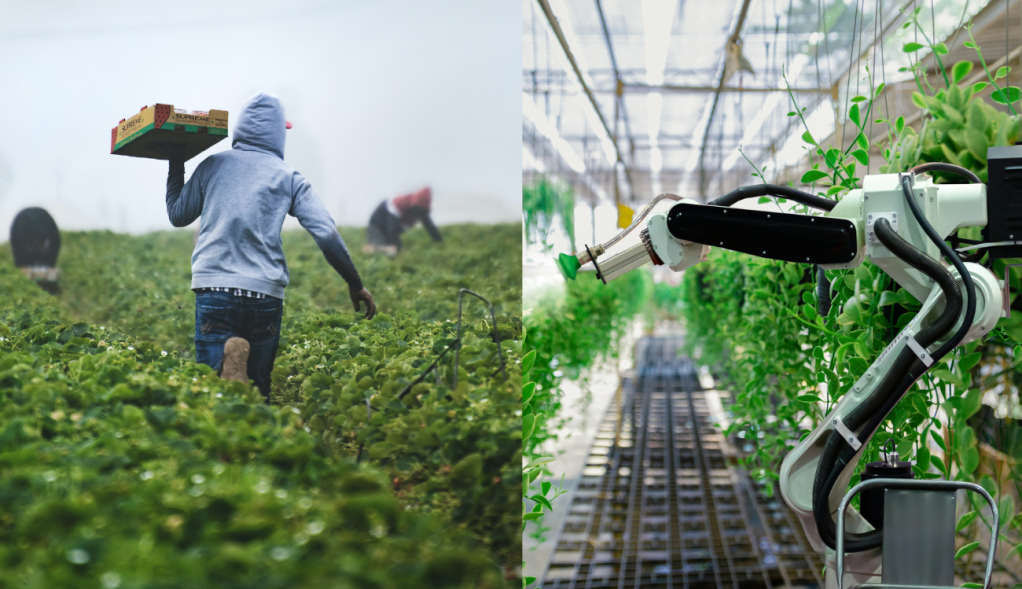European Institute Student Ambassador Ea Marty speaks with Dr Daniel Bradley about the green transition, working in the global south, environmental activism and more.
Since 2022, Dr Daniel Bradley has led the UK’s engagement with the EU on climate and the environment. This follows 20 years serving as a British government adviser and diplomat in Africa, Asia and South America on issues spanning poverty reduction, climate change, food security, deforestation and sustainable livelihoods.
Dr Bradley’s policy and diplomacy work with EU institutions aims to raise ambition and action on climate change. This includes bilateral EU-UK engagement to spur the pace of climate action in both places and UK-EU team-working in international fora such as climate negotiations and green transition partnerships with developing countries.
Dr Bradley recently visited UCL to provide a masterclass on the EU’s policy and delivery in the climate space, and to explore the political forces influencing EU positions. We spoke to him about the future of the UK and EU relationship and how this plays out on climate issues.
The UK, EU, and the green transition
In light of Brexit, questions frequently arise about the state of relations between the EU and the UK and their ability to fulfil promises regarding green transition.
Dr Bradley asserts that, throughout the challenging Brexit process and beyond, climate collaboration has remained an unwavering bright spot in the relationship. ‘We have never stopped talking about climate. It’s a shared and very pressing problem that transcends politics, and one that no-one can manage alone.’
In his view, neither side has figured out the best way of tackling climate risks and pushing through a green transition in ways that keep everyone on board. Despite elements of competition between the partners, he sees a strong case for both sides progressing better and faster by sharing ideas and working together. ‘Encouraging and enabling that conversation is a big part of my job. Progress can be uneven and messy, but there are shared goals and positive signs of real action on both sides.’
He recognizes both the UK and EU as early champions for setting a legal Net Zero commitment by 2050 and encouraging others to do the same. He also points to big strides in real delivery against this target. ‘The UK has cut its emissions nearly in half since 1990, while growing its economy by two thirds. That’s the fastest progress in the G7 and shows that green growth is possible. Similarly, the EU has passed unprecedented green legislation in the last four years and believes that it will exceed its 2030 target to reduce emissions by 55 percent.’
Nevertheless, Dr Bradley is realistic that neither side has fixed everything or is moving at the pace and scale that the science demands. Both the EU and UK are facing the same political challenge – to keep up the pace with the green transition now that hard delivery is starting to affect the needs and expectations of communities and businesses. ‘Leaders have to maintain public support and the social contract for green transition as elections approach by demonstrating that the best pathway for growth and employment is a green one.’
In his view, one of the EU’s key achievements has been to present the green transition as a lifeline out of multiple crises – from Covid to energy security and a solution to reliance on Russian hydrocarbons. ‘It’s smart to appeal to people’s pragmatism: clean solar and wind is a lot more appealing than Putin’s gas; electric vehicles make cities more livable; protecting nature protects human wellbeing. People generally get that. The skill is in communicating the benefits of transition.’
Dr Bradley notes positive signs that the EU and UK see green rendition as a joint project. This includes through physical and market connections between our electricity grids, including as part of the North Sea Energy Cooperation initiative. ‘Russia’s invasion of Ukraine sharpened our focus on the importance of connected grids for building energy security. Now we need to work to make the electricity that we generate and share as renewable as possible.’
According to Bradley, the effort to transition away from hydrocarbons is going to require ‘every tool in the box,’ and no alternatives should be excluded from the conversation. This includes nuclear energy, despite it being a divisive topic. The UK is majoring on offshore wind as its core energy source and uses far less nuclear power in its energy mix than countries like France, but it has retained nuclear as a low carbon energy source to balance intermittent renewables, and plans to use its world-leading innovation in small modular reactors to play a role in reducing reliance on gas.
EU-UK collaboration with developing countries
Dr Bradley’s role takes a strong focus on how the UK and EU can be better partners to developing countries on climate action. International development has been the core of his career, which began as a university field researcher living with nomadic herders and small farmers in semi-arid parts of rural Senegal while studying for his PhD in livelihood adaptation. This was instrumental in shaping his outlook in a career that has included six years in Brazil and nearly ten in India as a climate and development diplomat.
He explains the challenges developing countries face on climate action: ‘Meeting basic needs, lifting people out of poverty and dealing with real and present climate impacts are often seen as the immediate and pressing priority, while shifting to a green economy can feel like a separate and longer term goal. The challenge is to ring those two sets of goals closer together by finding ways to make clean energy and green growth the best and most affordable growth path.’
He acknowledges that it can feel hypocritical for Western countries that achieved prosperity off the back of fossil fuels to lobby developing nations to do things differently. He believes that all countries have the right to develop, but ‘the economics no longer favours hydrocarbons. Wind and solar power are cheaper than coal. Investing in fossil fuels is no longer a good bet – it risks lock-in to an expensive and polluting high carbon path that creates stranded assets. Affordable clean tech gives developing economies the opportunity to trail-blaze a better, different development path.’
Promising green collaborations that the EU and the UK have co-led include the Just Energy Transition Partnership (JETP) for Vietnam, alongside similar JETPs with Indonesia and South Africa. These place people at the centre of the green transition by driving clean energy transition in ways that create new economic opportunities for workers.
Dr Bradley believes that this is a promising model. ‘It’s not the answer in every place, but mobilising development partners around a single big problem in a few strategic locations can be a better use of resources than everyone having their own pet project. We’re hopeful that this will leverage private investment and enable the step changes in climate action that we badly need.’
Alongside more and better targeted finance, sharing ideas can sometimes be equally valuable. He explains: ‘My time in Delhi taught me that we have much to learn from India’s low-cost innovation, and they also seek new ideas from us. So, I focused there on creating Knowledge Partnerships that help us both advance specific challenges like introducing electric vehicles, but also allow the UK to better understand India’s needs.’
While some commentators question why the UK and the EU use taxpayers’ money to provide development assistance to other economies rather than focusing exclusively on domestic challenges, Dr Bradley insists on the value of global collaboration.
He maintains: ‘Climate is a global public good and creating a safer, greener, fairer world is beneficial for all. The faster we drive global green transition the faster the costs will come down. That’s good for everyone. If the UK achieved net zero overnight, it wouldn’t solve the global climate crisis – we account for less than one percent of global emissions. But helping to bend the emissions curve down in developing economies gives us a much better chance of meeting global temperature goals.’
The role of activism
As UK-based groups like Just Stop Oil continue to make headlines and stimulate vociferous debates, climate activism has never been a more pertinent topic. Dr Bradley shared that he was strongly influenced by the green movement while still at school and respects the right to protest, but chose to pursue a science, evidence and policy route rather than more extreme activism. ‘It’s another one of those ‘every tool in the box’ arguments. You need action in every form, so you have to bring your own skillset and mindset to the problem to see how you can best play your part in making change happen. My TEDx talk to students in Delhi focused on the idea that there is a role for everyone.’
An illustration of this view came through Dr Bradley’s encounter with teenage solar innovator and Earthshot Prize finalist Vinisha Umashankar. He recalls: ‘She stood on the stage with Prince William at COP26 and said that she quite understood why people of her age were angry, but that she didn’t have time to be angry because she just wanted to make things. I think that blew people away – truly inspirational.’
So, Dr Bradley is not quite ready to start gluing himself to trees just yet (give it time…) but he welcomes the way that voices from every part of the spectrum have helped to make climate change a mainstream economic conversation. He observes that to mobilise action at the pace and scale that the science demands means having difficult and sometimes confrontational interactions. ‘Activists make people uncomfortable and raise awareness, and there’s a role for that. But then you have to roll your sleeves up and go to work on the problem – get innovative and creative and find workable solutions.’
Career advice for aspiring diplomats
In addition to his insights on climate policy, Dr Bradley’s fascinating career holds lessons for students interested in diplomacy. He sees himself as an ‘accidental diplomat’. His passion for the natural environment and commitment to poverty reduction took him from field research into civil society and consultancy work before transitioning into international development as a vehicle to pursue his goals. Policy and programme work soon blended into ‘development diplomacy’.
Drawing from his experience, Dr Bradley highlights three essential skills for diplomacy:
Strategic focus: One’s ability to see the bigger picture, be clear about the higher level goal, identify upstream problems and opportunities early and have a plan to manage risks.
Delivery: One’s ability to work at pace and flex your approach and style to adapt to different situations and communication needs.
Collaboration: One’s ability to work well with a diverse range of people and create links between their interests to achieve a common goal.
For students eager to engage with the political sphere to address environmental issues, Dr Bradley thinks they should be bold, unafraid to speak up, and stay passionate about their beliefs. ‘For me it’s about integrity and believing in what you’re doing. Ultimately, we all work for a minister, and we have to follow a policy line. But if you know your stuff you need to have the courage to carefully challenge senior people if you see them taking a line that seems to be counter to the evidence. Otherwise, you’re not doing your job’.
While diplomacy is often about influencing, he also advises anyone interested in a diplomatic career to listen well and try to understand things from their interlocutor’s standpoint, in order to identify common ground. ‘My starting point is generally to figure out where we agree and to start from there. Stay focused on your goal and be mindful of your bottom line, but probe into what others are after and what is driving that. That gives you a better chance of working towards a consensus, packaging your messages in ways that relate to their agenda.’
He concludes by advising against a mindset of heroes and villains. ‘On climate issues it’s easy to pitch a narrative of good and bad guys. That’s rarely the case. There are generally a set of people that – in their context – are just making rational economic and political decisions. The skill is to navigate through that to build common interests.’
Éa Marty is currently in her second year pursuing a BA in Politics, Sociology, and East European Studies
Note: The views expressed in this post are those of the author, and not of the UCL European Institute, nor of UCL.





Leave a comment